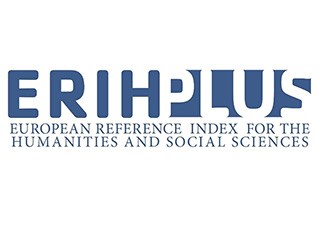
Movements and institutions concerned with consumer protection request to improve the standard of living of individuals and improve the quality of life for them. Consumerism among consumers, promoting them to keep pace with developments in various fields, raising their awareness of the risks that threaten their security and safety, and informing them of scientific, health and economic knowledge so that the consumer obtains his full rights without being exposed to fraud or marketing deception. Rationalizing consumer purchasing behavior, as this study was conducted on a sample of consumers in the state of Ouargla, and a questionnaire was used as a tool for the study, so the number of questionnaires used reached 200 forms), and the results showed that: There is a weak direct correlation estimated at (28%) between consumer protection associations purchasing behavior; The Consumer Protection Association played a weak role in providing targeted promotional programs to educate and rationalize consumers.
- Citation: Khouiled, A., Luca, F.A., Mahdjouba, H., Bennouna S.M. (2023). The role of consumer protection associations in rationalizing consumer purchasing behavior – an example of consumer research in the state of Ouargla. Management Intercultural, XXV (50), 7-17.
- Published on: 5 April 2023
- Keywords: consumer protection; consumer protection associations; purchasing behavior; rationalization of behavior; consumer awareness;
- Pages: 7-17
- Received: 25 February 2023
- Final revision and acceptance: 4 April 2023
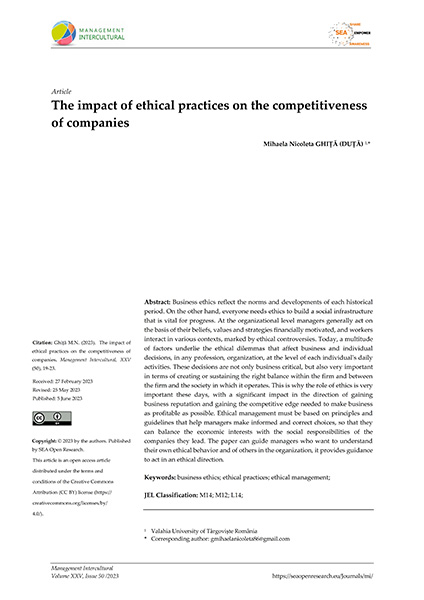
Business ethics reflect the norms and developments of each historical period. On the other hand, everyone needs ethics to build a social infrastructure that is vital for progress. At the organizational level managers generally act on the basis of their beliefs, values and strategies financially motivated, and workers interact in various contexts, marked by ethical controversies. Today, a multitude of factors underlie the ethical dilemmas that affect business and individual decisions, in any profession, organization, at the level of each individual's daily activities. These decisions are not only business critical, but also very important in terms of creating or sustaining the right balance within the firm and between the firm and the society in which it operates. This is why the role of ethics is very important these days, with a significant impact in the direction of gaining business reputation and gaining the competitive edge needed to make business as profitable as possible. Ethical management must be based on principles and guidelines that help managers make informed and correct choices, so that they can balance the economic interests with the social responsibilities of the companies they lead. The paper can guide managers who want to understand their own ethical behavior and of others in the organization, it provides guidance to act in an ethical direction.
- Citation: Ghiță M.N. (2023). The impact of ethical practices on the competitiveness of companies. Management Intercultural, XXV (50), 19-23.
- Published on: 5 June 2023
- Keywords: business ethics; ethical practices; ethical management;
- Pages: 19-23
- Received: 28 May 2023
- Final revision and acceptance: 4 April 2023
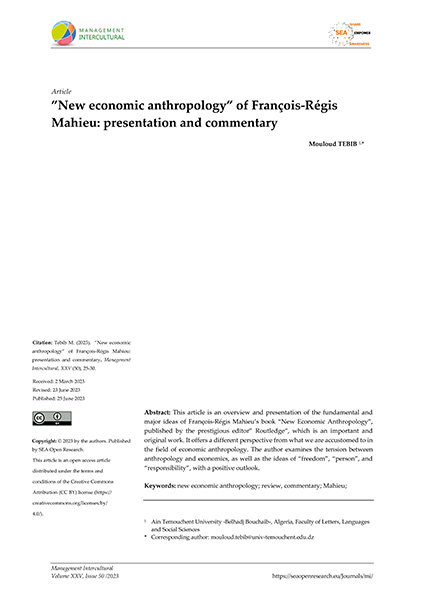
This article is an overview and presentation of the fundamental and major ideas of François-Régis Mahieu’s book “New Economic Anthropology”, published by the prestigious editor” Routledge“, which is an important and original work. It offers a different perspective from what we are accustomed to in the field of economic anthropology. The author examines the tension between anthropology and economics, as well as the ideas of “freedom”, “person”, and “responsibility”, with a positive outlook.
- Citation: Tebib M. (2023). ”New economic anthropology” of François-Régis Mahieu: presentation and commentary. Management Intercultural, XXV (50), 19-23.
- Published on: 25 June 2023
- Keywords: new economic anthropology; review, commentary; Mahieu;
- Pages: 25-30
- Received: 2 March 2023
- Final revision and acceptance: 23 June 2023
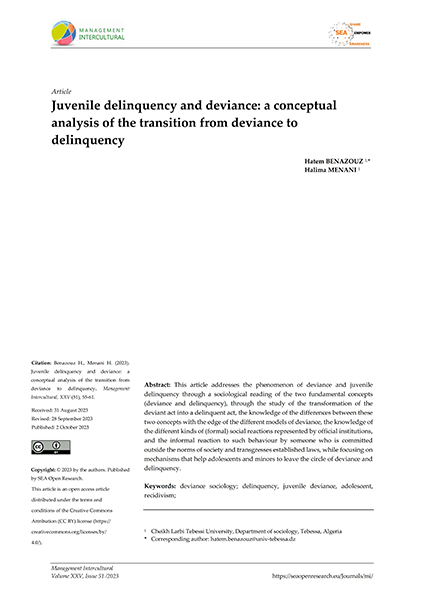
This article addresses the phenomenon of deviance and juvenile delinquency through a sociological reading of the two fundamental concepts (deviance and delinquency), through the study of the transformation of the deviant act into a delinquent act, the knowledge of the differences between these two concepts with the edge of the different models of deviance, the knowledge of the different kinds of (formal) social reactions represented by official institutions, and the informal reaction to such behaviour by someone who is committed outside the norms of society and transgresses established laws, while focusing on mechanisms that help adolescents and minors to leave the circle of deviance and delinquency.
- Citation: Benazouz H., Menani H. (2023). Juvenile delinquency and deviance: a conceptual analysis of the transition from deviance to delinquency. Management Intercultural, XXV (51), 55-61.
- Published on: 2 October 2023
- Keywords: deviance sociology; delinquency; juvenile deviance; adolescent; recidivism;
- Pages: 55-61
- Received: 31 August 2023
- Final revision and acceptance: 28 September 2023
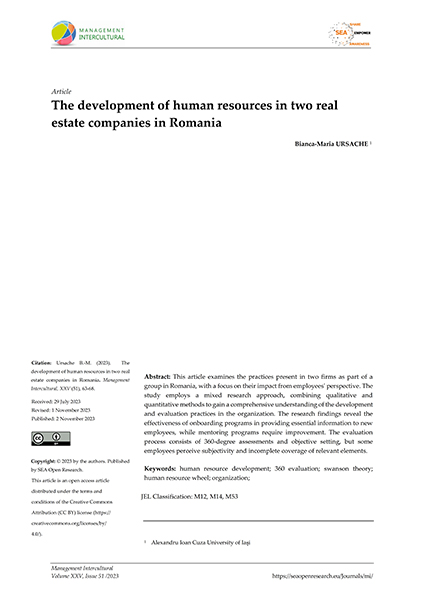
This article examines the practices present in two firms as part of a group in Romania, with a focus on their impact from employees' perspective. The study employs a mixed research approach, combining qualitative and quantitative methods to gain a comprehensive understanding of the development and evaluation practices in the organization. The research findings reveal the effectiveness of onboarding programs in providing essential information to new employees, while mentoring programs require improvement. The evaluation process consists of 360-degree assessments and objective setting, but some employees perceive subjectivity and incomplete coverage of relevant elements.
- Citation: Ursache B.-M. (2023). The development of human resources in two real estate companies in Romania. Management Intercultural, XXV (51), 63-68.
- Published on: 2 November 2023
- Keywords: human resource development; 360 evaluation; swanson theory; human resource wheel; organization;
- Pages: 63-68
- Received: 29 July 2023
- Final revision and acceptance: 1 November 2023

Taking measures regarding the inclusion of students with disabilities should be a concern for all universities. Both nationally and internationally, there are models of best practices that can provide guidance in this regard. Some of these are presented in this article, by way of example, in the hope that they could serve as a starting point and/or inspiration for future initiatives.
- Citation: Neculăesei (Onea) A.-N. (2023). Best Practices for the Inclusion of Students with Disabilities. Management Intercultural, XXV (51), 69-74.
- Published on: 11 November 2023
- Keywords: diversity; inclusion; good practices; students with disabilities; higher education institutions;
- Pages: 69-74
- Received: 12 September 2023
- Final revision and acceptance: 10 November 2023

The estimation of the impact of financial liberalization on economic growth in Algeria during the period 1990 – 2022 by an autoregressive VAR regression model shows that the financial development indicators, which are the credits granted to the private sector and the money supply, do not influence positively on the gross domestic product while the inflation rate negatively affects the GDP. The success of financial liberalization for the benefit of economic growth is conditioned by the respect of certain preconditions such as macroeconomic stability and financial development allowing the creation of a sphere encouraging savings and local and foreign investment favoring production to get rid of the rentier nature of financing the economy which puts the banking and financial sector outside its role of financial intermediation.
- Citation: Touil M. (2023). The financial liberalization: has it fostered economic growth in Algeria? Management Intercultural, XXV (51), 75-100.
- Published on: 11 December 2023
- Keywords: models of financial liberalization, economic growth, VAR (Time series models);
- Pages: 75-100
- Received: 04 October 2023
- Final revision and acceptance: 10 December 2023

The present study is a descriptive, exploratory approach, which aims to carry out a short conceptual analysis for the main predictors that describe the criminal behavior of the sociopathic type. Among them, in addition to the favorable environment, the authors describe the presence of the weapon in the criminal's social environment, considered one of the most important predictors of the development of sociopathic behavior. Added to this is the existence of defense mechanisms specific to the sociopathic personality.
- Citation: Botone D.N. (2023). Predictors of sociophatic behavior. Management Intercultural, XXV (51), 101-106.
- Published on: 11 December 2023
- Keywords: personality, aggression, sociopath, offender, weapon;
- Pages: 101-106
- Received: 01 October 2023
- Final revision and acceptance: 07 December 2023

This article deals with the paradoxical relationship between social harm and punishment, through criminal irresponsibility in mental disorders, so that the universality of crime, justified by the harmful act, is challenged by several currents, including, zemiology. Therefore, a normative and theoretical, even critical, analysis has been necessary in order to overcome the definition of crime through the social harm, which has proved to be purely circumstantial in the case of an affirmative defense as in the case of mental disorder. The recognition of social harm, strongly recommended by zemiologists, as well as social and structural accountability, is very important in the development of restorative justice. Consequently, the new doctrine goes beyond the consensual discourse on the notion of crime and the usefulness of punishment.
- Citation: Imad C. (2024). Crime and mental disorder – the paradox of social harm and punishment. Management Intercultural, XXVI (52), 7-15.
- Published on: 30 January 2024
- Keywords: zemiology; mental disorder; crime; social harm;
- Pages: 7-15
- Received: 14 December 2023
- Final revision and acceptance: 29 January 2024

Urban violence refers to any form of violence occurring in cities and suburbs. It may involve delinquent acts such as theft, physical assault, harassment, vandalism, etc. This article aims to provide a scientific explanation for the violent behavior and practices of young people. The observations and analyses conducted in this case study will seek, through an ethnographic approach, to go beyond the collected data in order to identify this new reality currently experienced in cities, especially in overcrowded neighborhoods, and to determine the factors contributing to the spread of this urban violence phenomenon in our towns and villages. Urban violence is a complex phenomenon that can have serious and lasting consequences on the affected individuals, families, and communities, in addition to being influenced by a variety of factors, including social inequalities, economic factors, and peer group dynamics.
- Citation: Belghit, M. T. (2024). Urban violence and criminality: a socio-ethnographic study. Management Intercultural, XXVI (52), 17-24.
- Published on: 24 March 2024
- Keywords: violence; ethnography; delinquency; crisis; young people; criminality;
- Pages: 17-24
- Received: 29 January 2024
- Final revision and acceptance: 23 March 2024

Industry 4.0, characterized by the integration of cyber-physical systems, advanced automation, and data-driven decision-making, marks a significant shift in manufacturing. This literature review synthesizes existing research to comprehensively explore Industry 4.0, encompassing its historical context, principles, technological enablers, challenges, applications, future directions, and implications. This literature review employed a systematic approach to gather and analyze relevant research articles on Industry 4.0.
- Citation: Rácz B.-G. (2024). Understanding industry 4.0: a literature review. Management Intercultural, XXVI (52), 17-24.
- Published on: 24 March 2024
- Keywords: industry 4.0; IoT; artificial intelligence;
- Pages: 25-30
- Received: 26 December 2023
- Final revision and acceptance: 22 March 2024

The form and nature of family communication in Algeria are influenced by a range of factors, such as globalization, modernization, the technological revolution, Western influence, changes in women's roles within the context of modernity and tradition, and various other elements. These factors vary based on the unique nature, size, customs, traditions, values, cultural level, role, status, and environment of each family. Considering modern changes, how do university students perceive and represent family communication? By examining the nature and models of family communication, this study aims to provide insights into the experiences of university students. The sample included 35 participants, / students from the Institute of Humanities and Social Sciences at the University Centre of Maghnia. Conducting an interview without specific constraints, which encompassed multiple questions related to family communication. The study revealed that students mostly use phone calls and social networks to communicate with their families, usually several times a week, and the common topics were studies and personal life. Despite the distance, most students felt close to their parents. Moreover, students’ experiences with digital communication and its effect on family relationships differed.
- Citation: Bencherki A., Benhamel D. (2024). Familly communication among university students: a preliminary investigation. Management Intercultural, XXVI (52), 31-35.
- Published on: 12 April 2024
- Keywords: family communication; society; student, university; tradition; modernity;
- Pages: 31-35
- Received: 15 February 2024
- Final revision and acceptance: 11 April 2024

Today's world comes with numerous challenges, especially in the educational space. New technologies and the virtual environment bring changes in values, attitudes, and behaviors, creating the premises for redefining the educational process on the one hand, and on the other hand, generating interest in the use of game elements in non-play contexts through gamification. The specialized literature supports this orientation by presenting the benefits and the problems that need to be addressed for better integration of gamification in university environments. One of the important issues highlighted is the need to adapt to cultural specificity, which is related to resistance to change, the nature of motivation, and the degree of appreciation for cooperation or competition, among other factors.
- Citation: Neculăesei (Onea) A. -N, Manolescu I. -T. (2024). Considering culture in redefining educational experiences through gamification. Management Intercultural, XXVI (52), 37-45.
- Published on: 31 May 2024
- Keywords: gamification; culture; cultural dimensions, higher education;
- Pages: 37-45
- Received: 18 April 2024
- Final revision and acceptance: 30 May 2024

The role of artificial intelligence in shaping Islamic finance services reflects a fusion of modern technology and Islamic principles, offering innovative opportunities to enhance financial services in ways that are compatible with Islamic law. This research paper aims to study the role of artificial intelligence in shaping Islamic finance services by addressing key theoretical literature related to artificial intelligence and Islamic finance and examining their relationship. Using a descriptive-analytical approach, the paper reviews current and future applications of artificial intelligence in financial services, as well as the major challenges in applying artificial intelligence in Islamic finance. The study concludes that artificial intelligence can enhance innovation in the Islamic finance sector by providing advanced and innovative solutions that better meet customer needs.
- Citation:: Guellil G., Bouri S. (2024). The role of artificial intelligence in shaping Islamic finance services. Management Intercultural, XXVI (53), 53-61.
- Published on: 24 July 2024
- Keywords: Artificial Intelligence; Islamic Finance;
- Pages: 53-61
- Received: 24 May 2024
- Final revision and acceptance: 22 July 2024

This article focuses on the notable increase in female criminality, which has generated special interest in criminology because it is a less common phenomenon than that of men. Analysis of female crime progressed beyond Lombroso’s early biological determinism. Recent studies show women are less frequently involved in serious crime compared to men, a difference that societal expectations of women may explain. Their social status and the choices available to them usually shaped women’s criminal behavior. Underlying this, however, is a less visible, less examined type of crime. Societal factors heavily influence the kinds of crimes women are involved in. This situation led to the development of specific theories about female crime, distinguishing itself from classical explanatory models focused on male crime. This theoretical progress contributed to a critical movement that challenged conventional methodologies, particularly through radical movements that emphasized the need to consider structural and societal aspects to understand female criminality.
- Citation: Menani H.,(2024). The Gendered Dimension of Crime: An Analysis of Female Criminality. Management Intercultural, XXVI (53), 63-70. https://doi.org/10.70147/m536370
- Published on: 20 December 2024
- Keywords: Crime and criminality; Criminological thought; Gender; Social context; Delinquency; Female;
- Pages: 63-70
- Received: 19 October 2024
- Final revision and acceptance: 2 December 2024
- Download: PDF
- Doi: https://doi.org/10.70147/m536370

As universities face increasingly high competition to attract students, social media are becoming more and more important in communication campaigns. The article aims to investigate the role that social networks have in admissions campaigns, by conducting a comparative study on the two main target audiences: high school students - who will go through the admissions process in the future and can provide information to develop possible strategies for future communication campaigns, and undergraduate students, who have already experienced the admission process and find out how they evaluate the impact of social media. As a result, we can see the role social media play in admissions campaigns and plan strategic directions for future communication actions.
- Citation: Grigoras A., (2024). Exploring Social Media Impact in Admission Campaigns. A Comparative Research. Management Intercultural, XXVI (53), 71-84. https://doi.org/10.70147/m537184
- Published on: 20 December 2024
- Keywords: Social Media, Higher Education, Romania, Admission Campaigns,
- Pages: 71-84
- Received: 30 November 2024
- Final revision and acceptance: 14 December 2024
- Download: PDF
- Doi: https://doi.org/10.70147/m537184

The purpose of this study is to investigate how Romanian universities communicate on social networks during the July 2022 admission campaign. The findings indicate that, even though Instagram and Tik Tok have become the most popular social media platforms among young people, in the case of public universities in Romania, with a few exceptions, universities are still using Facebook as the main social media platform, Instagram & Tik Tok messages being usually only a duplication of Facebook content.
- Citation: Grigoras A., (2024). Social Media Strategies Used in Romanian Universities’ Admission Campaigns. Management Intercultural, XXVI (53), 85-96. https://doi.org/10.70147/m538596
- Published on: 20 December 2024
- Keywords: Content Analysis, Social Media Networks, Universities, Romania, Admission Campaigns,
- Pages: 85-96
- Received: 30 November 2024
- Final revision and acceptance: 16 December 2024
- Download: PDF
- Doi: https://doi.org/10.70147/m538596
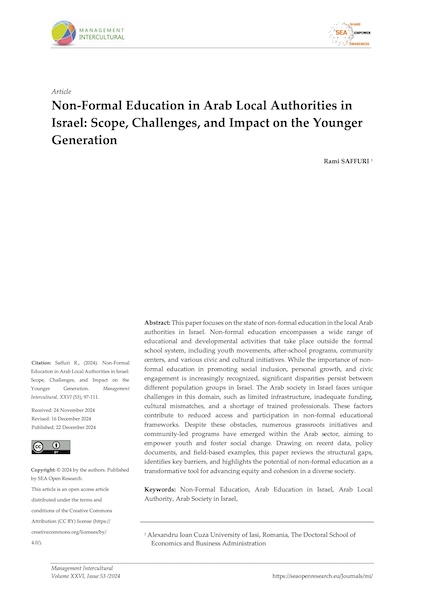
This paper focuses on the state of non-formal education in the local Arab authorities in Israel. Non-formal education encompasses a wide range of educational and developmental activities that take place outside the formal school system, including youth movements, after-school programs, community centers, and various civic and cultural initiatives. While the importance of non-formal education in promoting social inclusion, personal growth, and civic engagement is increasingly recognized, significant disparities persist between different population groups in Israel. The Arab society in Israel faces unique challenges in this domain, such as limited infrastructure, inadequate funding, cultural mismatches, and a shortage of trained professionals. These factors contribute to reduced access and participation in non-formal educational frameworks. Despite these obstacles, numerous grassroots initiatives and community-led programs have emerged within the Arab sector, aiming to empower youth and foster social change. Drawing on recent data, policy documents, and field-based examples, this paper reviews the structural gaps, identifies key barriers, and highlights the potential of non-formal education as a transformative tool for advancing equity and cohesion in a diverse society.
- Citation: Saffuri R., (2024). Non-Formal Education in Arab Local Authorities in Israel: Scope, Challenges, and Impact on the Younger Generation. Management Intercultural, XXVI (53), 97-111. https://doi.org/10.70147/m5397111
- Published on: 20 December 2024
- Keywords: Non-Formal Education, Arab Education in Israel, Arab Local Authority, Arab Society in Israel,;
- Pages: 97-111
- Received: 24 November 2024
- Final revision and acceptance: 16 December 2024
- Download: PDF
- Doi: https://doi.org/10.70147/m5397111
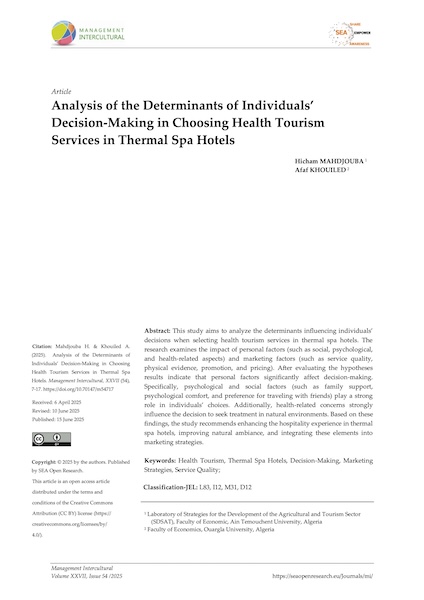
This study aims to analyze the determinants influencing individuals’ decisions when selecting health tourism services in thermal spa hotels. The research examines the impact of personal factors (such as social, psychological, and health-related aspects) and marketing factors (such as service quality, physical evidence, promotion, and pricing). After evaluating the hypotheses results indicate that personal factors significantly affect decision-making. Specifically, psychological and social factors (such as family support, psychological comfort, and preference for traveling with friends) play a strong role in individuals’ choices. Additionally, health-related concerns strongly influence the decision to seek treatment in natural environments. Based on these findings, the study recommends enhancing the hospitality experience in thermal spa hotels, improving natural ambiance, and integrating these elements into marketing strategies.
- Citation: Mahdjouba H. & Khouiled A. (2025). Analysis of the Determinants of Individuals’ Decision-Making in Choosing Health Tourism Services in Thermal Spa Hotels. Management Intercultural, XXVII (54), 7-17. https://doi.org/10.70147/m54717
- Published on: 15th June 2025
- Keywords: Health Tourism, Thermal Spa Hotels, Decision-Making, Marketing Strategies, Service Quality,
- Pages: 7-17
- Received: 6th April 2025
- Final revision and acceptance: 10th June 2025
- Download: PDF
- Doi: https://doi.org/10.70147/m54717
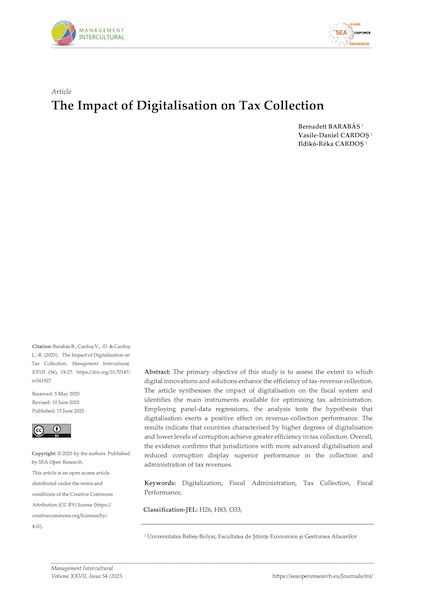
The primary objective of this study is to assess the extent to which digital innovations and solutions enhance the efficiency of tax-revenue collection. The article synthesises the impact of digitalisation on the fiscal system and identifies the main instruments available for optimising tax administration. Employing panel-data regressions, the analysis tests the hypothesis that digitalisation exerts a positive effect on revenue-collection performance. The results indicate that countries characterised by higher degrees of digitalisation and lower levels of corruption achieve greater efficiency in tax collection. Overall, the evidence confirms that jurisdictions with more advanced digitalisation and reduced corruption display superior performance in the collection and administration of tax revenues.
- Citation: Barabás B., Cardoș V., -D. & Cardoș I., -R. (2025). The Impact of Digitalisation on Tax Collection. Management Intercultural, XXVII (54),19-27. https://doi.org/10.70147/m541927
- Published on: 15th June 2025
- Keywords: Digitalization, Fiscal Administration, Tax Collection, Fiscal Performance,
- Pages: 19-27
- Received: 5th May 2025
- Final revision and acceptance: 10th June 2025
- Download: PDF
- Doi: https://doi.org/10.70147/m541927
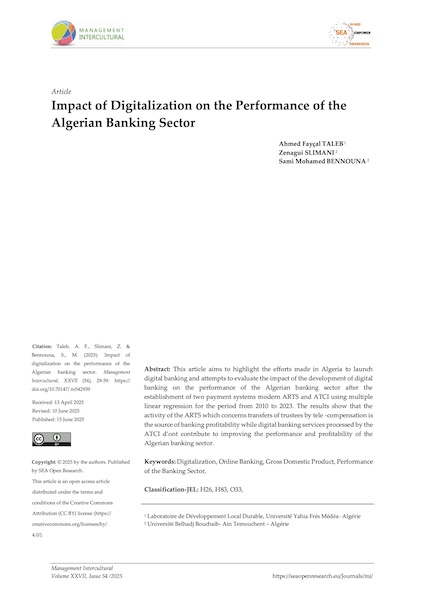
This article aims to highlight the efforts made in Algeria to launch digital banking and attempts to evaluate the impact of the development of digital banking on the performance of the Algerian banking sector after the establishment of two payment systems modern ARTS and ATCI using multiple linear regression for the period from 2010 to 2023. The results show that the activity of the ARTS which concerns transfers of trustees by tele -compensation is the source of banking profitability while digital banking services processed by the ATCI d’ont contribute to improving the performance and profitability of the Algerian banking sector.
- Citation: Taleb, A. F., Slimani, Z. & Bennouna, S., M. (2025). Impact of digitalization on the performance of the Algerian banking sector. Management Intercultural, XXVII (54), 29-39. https://doi.org/10.70147/m542939
- Published on: 15th June 2025
- Keywords: Digitalization, Online Banking, Gross Domestic Product, Performance of the Banking Sector,
- Pages: 29-39
- Received: 13th April 2025
- Final revision and acceptance: 10th June 2025
- Download: PDF
- Doi: https://doi.org/10.70147/m542939
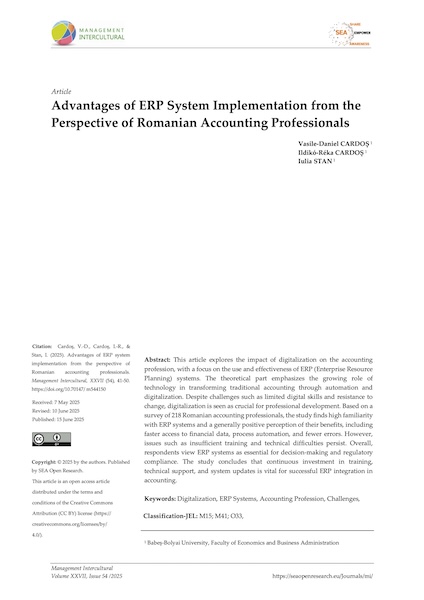
This article explores the impact of digitalization on the accounting profession, with a focus on the use and effectiveness of ERP (Enterprise Resource Planning) systems. The theoretical part emphasizes the growing role of technology in transforming traditional accounting through automation and digitalization. Despite challenges such as limited digital skills and resistance to change, digitalization is seen as crucial for professional development. Based on a survey of 218 Romanian accounting professionals, the study finds high familiarity with ERP systems and a generally positive perception of their benefits, including faster access to financial data, process automation, and fewer errors. However, issues such as insufficient training and technical difficulties persist. Overall, respondents view ERP systems as essential for decision-making and regulatory compliance. The study concludes that continuous investment in training, technical support, and system updates is vital for successful ERP integration in accounting.
- Citation: Cardoș, V.-D., Cardoș, I.-R., & Stan, I. (2025). Advantages of ERP system implementation from the perspective of Romanian accounting professionals. Management Intercultural, XXVII (54), 41-50. https://doi.org/10.70147/m544150
- Published on: 15th June 2025
- Keywords: Digitalization, ERP Systems, Accounting Profession, Challenges,
- Pages: 41-50
- Received: 7th May 2025
- Final revision and acceptance: 10th June 2025
- Download: PDF
- Doi: https://doi.org/10.70147/m544150

This article carries out a systematic analysis of the way in which primary emotions were described and understood in Antiquity, starting from East to West. From the Japanese space to the Egyptian and Greek territory, across the Asian, European and African continents, following the paths of the most valuable road of those times - the Silk Road -, the article proposes a brief review of the way in which the six primary emotions identified by Paul Ekman were experienced: joy, sadness, anger, fear, disgust and surprise. Making an incursion into the history of psychology, namely the way in which the main religions and historical events influenced emotional experiences in Antiquity, the article attempts to demonstrate that certain primary emotions were not universal: emotions are understood and experienced differently, from one culture to another, from one religion to another, from one time to another.
- Citation: Botone, D., (2025). Psychology of Emotions in Antiquity. From East to West, for Understanding Emotions. Management Intercultural, XXVII (54), 51-57. https://doi.org/10.70147/m545157
- Published on: 30 June 2025
- Keywords: Emotions, Aristotel, Platon, Confucius, Rumi, Feelings, Antiquity, Psychology,
- Pages: 51-57
- Received: 10 May 2025
- Final revision and acceptance: 12 June 2025
- Download: PDF
- Doi: https://doi.org/10.70147/m545157



